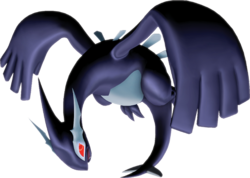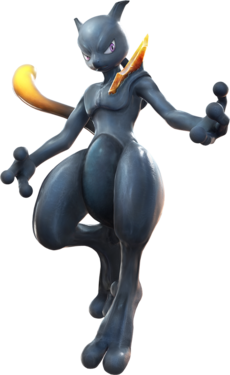Shadow Pokémon: Difference between revisions
| Line 16: | Line 16: | ||
* The effectiveness of different purification actions in Colosseum is on average greater than the same actions in XD, but at the same time, the average magnitude of a Shadow Pokémon's full [[Heart Gauge]] is larger in Colosseum than in XD. | * The effectiveness of different purification actions in Colosseum is on average greater than the same actions in XD, but at the same time, the average magnitude of a Shadow Pokémon's full [[Heart Gauge]] is larger in Colosseum than in XD. | ||
* Shadow Pokémon in the first game sometimes enter Hyper Mode, but in XD they enter Reverse Mode instead. | * Shadow Pokémon in the first game sometimes enter Hyper Mode, but in XD they enter Reverse Mode instead. | ||
** In Hyper Mode a Pokémon may attack its Trainer, but in Reverse Mode, they will not. | ** In Hyper Mode, a Pokémon may attack its Trainer, but in Reverse Mode, they will not. | ||
** While in Reverse Mode, a Pokémon hurts itself after every turn, whereas a Pokémon in Hyper Mode incurs no self-damage. | ** While in Reverse Mode, a Pokémon hurts itself after every turn, whereas a Pokémon in Hyper Mode incurs no self-damage. | ||
* In Pokémon Colosseum, [[Shadow move]]s have neutral effectiveness against all types, but in Pokémon XD, Shadow moves are super effective on non-Shadow Pokémon and not very effective on other Shadow Pokémon. | * In Pokémon Colosseum, [[Shadow move]]s have neutral effectiveness against all types, but in Pokémon XD, Shadow moves are super effective on non-Shadow Pokémon and not very effective on other Shadow Pokémon. | ||
Revision as of 15:00, 12 April 2016
Shadow Pokémon (Japanese: ダークポケモン Dark Pokémon) are Pokémon that are being used for wrongful acts because they had the doors to their hearts shut artificially, a process created and carried out by Cipher in the Orre region. Collecting Shadow Pokémon through snagging and restoring them to normal by purifying them is the main goal of Pokémon Colosseum and Pokémon XD: Gale of Darkness.
Creation and behavior
Shadow Pokémon are created through an undisclosed process that removes the Pokémon's emotions, turning it into a soulless fighting machine. Ein, creator of the process and Cipher's head scientist at the time of Colosseum, refers to this process as "shutting the door to their hearts". In XD, Cipher's science division refines and upgrades the process, allowing many Shadow Pokémon to be produced simultaneously. The head of the science division, Cipher Admin Lovrina, also works on stabilizing the process to increase resistance to purification; her ultimate goal is to create a Shadow Pokémon that is completely impossible to purify.
While normal Pokémon are generally friendly and trusting creatures, Shadow Pokémon are not hesitant to attack with full force, using Shadow moves, such as Shadow Rush. Likewise, they do not attack only other Pokémon, and will actually attack Trainers. Shadow Pokémon can sometimes be overwhelmed by their emotions, indicating the relative instability of their Shadow state, and will sometimes enter a state known as Hyper Mode in Colosseum and Reverse Mode in XD. This state will be triggered more often the closer the Pokémon is to purification, making them generally more difficult to battle with until they are ultimately purified. A Pokémon in this state can be cured of it by calling to it in battle or use of a scent, as well as several other methods, or can recover on its own.
An interesting quirk about Shadow Pokémon is their inability to be differentiated from normal Pokémon by all but those with certain abilities or tools. Shadow Pokémon emit a normally invisible dark aura that normal Pokémon do not, which so far has only been able to be detected by Rui through an innate ability, and Michael with his Aura Reader.
Shadow Pokémon cannot level up, and any experience and effort values they gain in battle will be held until they are purified, at which point it will be awarded en masse.
Differences between Colosseum and XD
Although the concept of Shadow Pokémon remains basically the same between the two games, there are some differences:
- The effectiveness of different purification actions in Colosseum is on average greater than the same actions in XD, but at the same time, the average magnitude of a Shadow Pokémon's full Heart Gauge is larger in Colosseum than in XD.
- Shadow Pokémon in the first game sometimes enter Hyper Mode, but in XD they enter Reverse Mode instead.
- In Hyper Mode, a Pokémon may attack its Trainer, but in Reverse Mode, they will not.
- While in Reverse Mode, a Pokémon hurts itself after every turn, whereas a Pokémon in Hyper Mode incurs no self-damage.
- In Pokémon Colosseum, Shadow moves have neutral effectiveness against all types, but in Pokémon XD, Shadow moves are super effective on non-Shadow Pokémon and not very effective on other Shadow Pokémon.
- In Colosseum, the only Shadow move that Shadow Pokémon can know is Shadow Rush, but in XD, Shadow Rush is one of many Shadow moves.
Relationship with Trainers
Strangely enough, a Shadow Pokémon that isn't under the care of the player will not enter Hyper Mode / Reverse Mode or apparently reduce its Heart Gauge, although a Shadow Pokémon the player controls will purify itself just by being in the Trainer's party.
An important difference between Colosseum and XD is the number of Shadow Pokémon each Cipher member carries: in Colosseum, each NPC Trainer only carries one at a time; in XD there are many Trainers with two or more Shadow Pokémon in their team, the first one being encountered at the Cipher Key Lair, and the final boss of the game has seven Shadow Pokémon under his care. This may be a result of the large number of Shadow Pokémon in XD.
Gameplay differences between Shadow and non-Shadow Pokémon
The Trainer of a Shadow Pokémon cannot do any of the following with it until it is purified:
- Level it up (when it is purified, it gains all the exp. accumulated as a Shadow Pokémon).
- Evolve it (evolves when gaining exp.)
- Use a Rare Candy on it.
- Change the order of its moves.
- Delete its moves.
- Give it a nickname.
- Trade it.
- Participate in Battle Mode with it.
- Enter it in battles at Phenac Stadium.
- Enter it in battles at Orre Colosseum.
Purification
- Main article: Purification
A Shadow Pokémon's purification process will begin as soon as it has been snagged, which is directly indicated by its Heart Gauge. Replacing the experience bar, the Heart Gauge monitors how close the Pokémon is to being fully purified, with the dark purple fill gradually depleting.
Pokémon can be purified from their Shadow state in several ways with varying effectiveness:
- Walking around: A Shadow Pokémon carried with the player in their party will open its heart a bit every 256 steps.
- Battling: A Shadow Pokémon sent into battle will open its heart a bit. Battling is also the only way a Shadow Pokémon can enter Hyper Mode or Reverse Mode.
- Calling: If a Shadow Pokémon is in Hyper Mode or Reverse Mode, calling to it will return it to its senses and open its heart somewhat.
- Massaging: Using special Scents, Shadow Pokémon can be massaged to open their heart.
- Day Care: In Colosseum only, a Shadow Pokémon put into the Day Care in Agate Village will open its heart for every 256 steps the player takes. In Pokémon XD, Shadow Pokémon are not accepted by the Day Care.
- Celebi: In Colosseum, using a Time Flute, the player can call Celebi to instantly purify a Shadow Pokémon.
- Purify Chamber: Between Pokémon Colosseum and Pokémon XD, a special chamber was developed in the Pokémon HQ Lab that can quickly purify Shadow Pokémon.
Nature and stats
A Shadow Pokémon, when encountered, is generated in the same way that a wild Pokémon is generated in the Generation III games, with its personality value and individual values generated together and no effort values. Shadow Pokémon don't have a set Nature or a set gender, but once encountered, the personality value, Nature and IVs are saved to the memory for the Shadow Monitor to be able to keep track of their exact status and location. This means that once a Shadow Pokémon is encountered for the first time, its Nature, IVs and gender will remain the same for the rest of the game, even if the player fails to capture it or is forced to re-battle it later.
List of Shadow Pokémon
- Main article: List of Shadow Pokémon
Shiny Shadow Pokémon
- Main article: List of glitches in Generation III
In Pokémon Colosseum, like in the main series games, there is a 1/8192 chance of a Shadow Pokémon being Shiny; however, when a Shiny Shadow Pokémon is captured, it is highly improbable that the Pokémon will retain Shininess. Conversely, when an ordinary Shadow Pokémon is captured, there is still the 1/8192 chance of that Pokémon becoming Shiny when it is sent to the player's party or the Pokémon Storage System. Shininess is retained through purification.
However, in Pokémon XD, this glitch was corrected. When the game calculates a personality value, it checks against the player's ID numbers and the opponent's ID numbers. If the game were to generate a Shiny personality value, it would then recalculate the personality value until it would not be Shiny with either the player's or the opponent's ID numbers. As a consequence of fixing this glitch from Pokémon Colosseum in Pokémon XD, the game ensures that all Shadow Pokémon are never Shiny. This defeats the still-popular rumor that Shadow Pokémon can be shiny after purification; all of these values are determined when they are encountered for the first time and are not linked to purification in any way.
In other games
Pokkén Tournament
In November 2015, a new character called Shadow Mewtwo (Japanese: ダークミュウツー Dark Mewtwo) was revealed for Pokkén Tournament, notably having the same prefix as the Shadow Pokémon in Colosseum and XD in both Japanese and English. In the past, Anne was almost possessed by a Shadow Synergy Stone but was saved by Mewtwo, whom the Shadow Synergy Stone took control of and merged with instead. Under the influence of the Shadow Synergy Stone, Shadow Mewtwo traveled around Ferrum, draining Gaia power from the normal Synergy Stones and continually increasing its own power. Shadow Mewtwo is eventually defeated in battle by the player, after which Anne uses the power of the Synergy Stone contained in her brooch to separate the Shadow Synergy Stone from Mewtwo and restore it to normal.
Trivia
- Shadow Pokémon are the only kind of Pokémon that can be caught from another Trainer.
In other languages
| |||||||||||||||||||||


